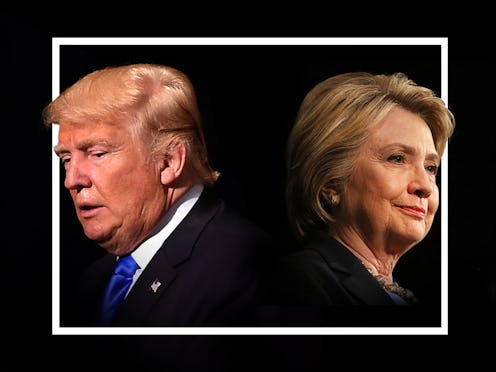News
The Biggest Thing To Remember About 2016

Any time there's a presidential election, both sides have to make it seem like the stakes are toweringly high. People will vote pragmatically given a certain set of circumstances, sure, but it doesn't feel quite so animating or urgent if there's not as much on the line. In this coming general election, though, highlighting subtle, nuanced distinctions probably won't be necessary. To the contrary, if there's one thing to know about the 2016 election, it's that it'll offer a stark choice between competent center-left Democratic governance on the one hand, and a new breed of American authoritarianism on the other.
The "A" word ― in addition to the "F" word, and even the occasional "H" word ― has been tossed around a fair amount about Trump's appeal, specifically the idea that he allures voters who have more authoritarian attitudes. Whether or not that's entirely true (the Washington Post's Wendy Rahn and Eric Oliver pretty compellingly disputed this idea back in March), it's hard to argue that Trump didn't project this image while wooing the Republican base throughout the primary process.
Whether it's his blindingly simplistic policy proposals, seemingly explained strictly through use of raw power or force of will (like his Mexico-funded border wall), or his willingness to call for violence at his political rallies, or how he echoes the ghoulish tones of the dictatorial strongman in enthusiastically endorsing the use of torture, it's grisly and it's in-your-face.
And it has plainly had a virulent effect on American politics already, even if he never makes it to the White House. While the average Trump voter isn't actually all that different from Republican voters in years past ― according to an analysis by Politico, he hasn't actually expanded the GOP so much as lured reliable general election voters out for the primary ― the erosion of political and behavior norms he's exploited is very new, and very dangerous.
For a prime example, just look at how many Republican primary voters support Trump's proposed ban on Muslims entering the United States, a policy that'd be both a moral disaster of historic proportions, and a national security blunder on par with any in modern history. Simply put, when pollster asked, the GOP electorate broadly replied "hell yes." A Morning Consult poll conducted in March found that an absolutely staggering percentage of Republicans backed the Muslim ban: 71 percent.
And the toxic appeal doesn't stop there ― a full 39 percent of Democrats supported it too, as well as 49 percent of independents, working out to a narrow 51 percent majority of all voters polled. Those, simply put, are horrifying numbers, whether you're mainly galled by the reactionary xenophobia, or concerned with the perceptions such a policy would create with Muslims worldwide. Suffice it to say, dependent as it is on a supply of heavily stigmatized and disaffected Muslims ripe for recruitment, there's good reason for ISIS to pull for a Trump presidency.
The well-documented scenes of violence and chaos at Trump rallies also speak to the important of norms and standards in politics, particularly the standards that say "don't advise your supporters to beat up protesters during your events." And even though he may be making a modest effort to clean up his act now, all the sit-downs with Megyn Kelly in the world can't erase his decades of making wildly sexist, abusive remarks.
The whole gross legacy is maybe best summed up by this comment about women, reported by New York magazine in the early '90s: "You have to treat 'em like shit." It should come as no surprise that Trump counts so much support from the so-called Men's Rights community.
Ultimately, Trump's near complete disregard for commonly held decency is probably the single most unique thing about the 2016 race, and it could potentially be the most important, too. Not because practical policy questions like immigration or reproductive rights aren't hugely important, but because those are issues that virtually any Republican nominee is going to hold the same opinion on. Contrary to what Trump likes to say, he was never the only person in the GOP talking about immigration, nor was he the first person to propose a border wall.
He's just the first person to so explicitly and vulgarly make the case like this, within the first five minutes of entering a presidential race. Not even Steve King went quite as far as Trump did when the now Republican front-runner said:
The U.S. has become a dumping ground for everybody else's problems. Thank you. It's true. And these aren't the best and the finest. When Mexico sends its people, they’re not sending their best. They’re not sending you, they’re not sending you. They’re sending people that have lots of problems, and they’re bringing those problems with us. They’re bringing drugs, they’re bringing crime, they’re rapists, and some I assume are good people.
In short, if you're looking for the bright, glaring distinction in 2016, the potential threat that should spur you into political engagement, this is it. Facing a nominee from a party that holds some broadly discriminatory ideas is bad enough on it's own ― odds are the people backing Trump's Muslim ban always felt that way to some extent, but had simply never heard a major presidential candidate say it clearly, forcefully, and without apology.
And that piece of the picture is huge. Giving air and legitimacy to these sorts of draconian ideas and authoritarian rhetoric, especially someone with Trump's near-universal name recognition, helps normalize them. And then pretty soon, overt bigotry and malice become just more political talking points up for debate ― even more so than they are now, anyways. Hopefully the United States will never end up seeing that future, but even simply getting this far, Trump may have rung a bell that can't be unheard.
Image: Dawn Foster/Bustle (1)